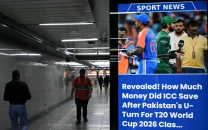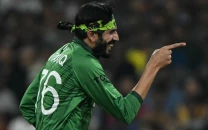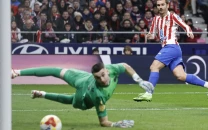Europe’s treble trouble
There is more at stake than just the title of Champions of Europe

PHOTO: AFP
Saturday, June 6 will mark one of the most iconic clashes in European football when Barcelona take on Juventus at the Olympiastadion in Berlin to vie for the biggest club award in Europe — the UEFA Champions League.
This year, however, there is more at stake than just the title of Champions of Europe. With both sides having already completed the league and cup double in Spain and Italy, the winner will forever write their name in history with a treble.
The Old Lady, having won two Champions Leagues, will win their first ever treble if they do so in Berlin, while Barcelona can become the first team to complete the set twice; having
previously done so under Pep Guardiola in 2009.
However, despite all the excitement surrounding the fixture, the sheen around the once in a lifetime achievement seems to have faded just that little bit. Perhaps, it is so because the once-in-a-lifetime achievement can no longer be categorised as such.
The treble has been accomplished too often in the past decade for it to be considered as an anomaly anymore. Where once it was a rarity, a freak incident, a form of unprecedented glory, it has now become a routine for the ‘super clubs’ of Europe. For some clubs, as Guardiola will testify, it has even become an expectation.

Teams reaching the final of the Champions League are now expected to assemble a squad which has the mental and physical endurance to do a domestic double in addition to the Champions League. And the fact that this can only be achieved by a select few who have the resources, evidences the polarity that has plagued football since the dawn of the new century.
There would have been four trebles in the last seven years after the final in Berlin is played out. Before that, there had only been four in 54 years. Perhaps the medal collection of Samuel Eto’o best epitomises this new trend; he is the only player so far to have won a treble twice, having first done so with Barcelona in 2009 and following it up the very next year with Inter in 2010 as Jose Mourinho’s side conquered all they faced. Of course Gerard Pique, Dani Alves, Sergio Busquets, Pedro, Lionel Messi, Andres Iniesta and Xavi of Barcelona’s current side will be added to this list if they win the final.
Looking back at the European trebles
Scottish giants Celtic, nicknamed the Lisbon Lions, defeated Inter Milan 2-1 in the 1967 European Cup final to become the first European team to achieve the treble. The Glasgow giants won every competition they entered that season; the Scottish League, the Scottish Cup, the Scottish League Cup, the Glasgow Cup and the European Cup.
The team’s success was all the more remarkable considering that the never heard of feat was achieved with a squad made up entirely of players from within 30 miles of the Celtic Park.
Five years later, Dutch club Ajax, built around the famous philosophy of ‘Total Football’, became the second side to achieve the treble when they won the Eredivisie, the KNVB Cup and the European Cup in 1972.
Even though the side included the likes of Johan Cruyff, the biggest proponent of ‘Total Football’, and had successfully defended the European title in 1972 and even went on to win the following year, the ‘unachievable’ treble was never repeated.

PSV Eindhoven became the third team to record a treble when they defeated Portuguese club Benfica 6-5 on penalties in Stuttgart in 1988.
Manchester United then completed a dramatic turnaround with two goals in injury time in a smash-and-grab 2-1 win over Bayern Munich at the Camp Nou in 1999.
While the first four trebles happened almost a decade apart from each other, the recent ones are clustered within a decade.
Guardiola’s all-conquering Barcelona side defeated Manchester United in the 2009 Champions League final in Rome to record their first-ever treble.
Inter Milan recorded the same the following year under Mourinho and Bayern Munich achieved theirs three years later when Dutch international Arjen Robben slotted the ball past Borussia Dortmund’s Roman Weidenfeller in the 89th minute at the Wembley Stadium to gift coach Jupp Heynckes a fitting farewell.
Now we await the crowning of a fourth treble winner in just seven years.
The Bosman ruling of 1995
So what has allowed clubs to achieve the once almost impossible treble with such ease? There obviously cannot be one answer, but most of the dots can be connected back to a court ruling which completely changed the landscape of European football — the Bosman Ruling.
Jean-Marc Bosman, a Belgian professional footballer who had run down his contract with FC Liege, wanted to move to French club Dunkirk in 1990. He however was prevented from joining the French side as FC Leige had put a transfer fee on him — back then out-of-contract players were bound to their old clubs till their ‘development’ expenses (the transfer fee) were not paid off. This sum was out of reach of Dunkirk and thus effectively ruled out the possibility of Bosman moving to France.
The Belgian, naturally disenfranchised by his club’s tactics, decided to take the issue to court against the Belgian and European authorities and five years later on December 15, 1995, he succeeded in his pursuit.
The court upheld Bosman’s proposition and abolished the previous rule of ‘out-of-contract players being bound to their clubs’. In addition to this ruling, the court also took into consideration the argument that as ‘football’ in Europe is an economic activity, and European Union workers were allowed to move freely in Europe, thus the previous law, which restricted the number of foreign players to three players in European competitions, was also abolished.
With the ruling, more power was handed to the players by stating that those who were out of contract will be allowed to move freely to any club that they deem fit and that there were no obligations to their former club, with whom they had already seen out their contract. It is because of this ruling that clubs offer long term contracts to players so that whenever any transfer scenario arises, the club would not be in a position to not get any compensation.
Before the Bosman ruling, there was a limit on the number of foreign players that clubs could feature in European competitions. Three foreign players and two ‘arbitrary’ players — foreigners who have spent more than five years in the country — were allowed to be part of the squad when playing in European competitions and the rest were expected to be recruited from the home country.
With the abolishment of the ‘3+2 rule’, there were now no restrictions on the number of foreign players within Europe and add that to the fact that players were not bound to their former clubs, a new generation of ‘millionaire’ footballers was born.
In pursuit of the riches of the Champions League, sponsorship deals, broadcasting deals etc. clubs now had the power to assemble the best team from all of Europe. Clubs with resources, especially from the top five leagues of Europe — Spain, Italy, England, Germany and France —started recruiting the best talent, while smaller clubs increasingly saw themselves being marginalised.
This in turn led to a vicious cycle, where clubs who qualified for the Champions League, were reimbursed with massive amounts of money (€993m from UEFA’s total prize pool — 55% paid in fixed amounts (group stage, knockout stage), while 45% would be divided according to a league’s comparative value. This money is utilised to reinforce the squads for next season such as Bayern Munich, when they bought in Robert Lewandowski and Mario Gotze from Borussia Dortmund after their 2013 treble.
The era of the super clubs
It can be safe to say that had it not been for the Bosman Ruling, Manchester United and Inter Milan would not have won the treble in 1999 and 2010.
With the lifting of the restrictions of foreign players came the advent of an era where financial muscle came into play more effectively than it ever had before in Europe. Bigger clubs could now use their resources to assemble squads which previously would be impossible to imagine, while players were also in position to demand the best wages for their services.
Wages increased drastically thereby making it difficult for smaller clubs to compete in bigger leagues and slowly and gradually the world of football started experiencing heavy polarisation.
In today’s era very few can imagine Nottingham Forest, comprised entirely of British players plus three Scottish players, going on to win the Champions League. They have already won the competition twice (1978-79, 1979-80) and even today there are ways to the Champions League, via the long route of the FA Cup and the short route of the Europa Cup but then why is it that smaller clubs find it difficult to recruit or develop teams which could challenge any opposition on the basis of their talent and not their price tag?

The simple answer once again is the Bosman Ruling.
Even though modern football has increased opportunities to develop legends like Zinedine Zidane, David Beckham, Thierry Henry, Lionel Messi, Cristiano Ronaldo and a long list of other brilliant footballers, it has considerably weighed down on the ability of smaller clubs to make their way through.
While footballers of the 21st century cruise away in their convertibles and enjoy the aftermath of the Bosman Ruling, it is the sport and its declining competitiveness which has sparked off a new debate and hopefully more people like Football Association (FA) Chairman Greg Dyke would come forward and try to balance the effects of Bosman.
The ruling itself was not regressive, its unmonitored aftereffects are making it regressive.
Published in The Express Tribune, June 5th, 2015.
Like Sports on Facebook, follow @ETribuneSports on Twitter to stay informed and join in the conversation.



















COMMENTS
Comments are moderated and generally will be posted if they are on-topic and not abusive.
For more information, please see our Comments FAQ